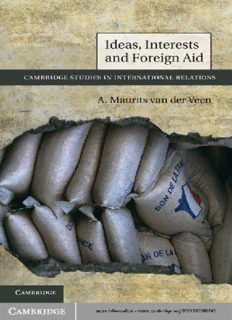
Ideas, Interests and Foreign Aid PDF
Preview Ideas, Interests and Foreign Aid
This page intentionally left blank Ideas, Interests and Foreign Aid Why do countries give foreign aid? Although many countries have official development assistance programmes, this book argues that no two of them see the purpose of these programmes in the same way. Moreover, the way countries frame that purpose has shaped aid policy choices past and present. The author examines how Belgium long gave aid out of a sense of obligation to its former colonies, the Netherlands was more interested in pursuing international influence, Italy has focused on the reputational payoffs of aid flows, and Norwegian aid has had strong humanitarian motivations since the beginning. But at no time has a single frame shaped any one country’s aid policy exclusively. Instead, analys- ing half a century of legislative debates on aid in these four countries, this book presents a unique picture both of cross-national and over-time patterns in the salience of different aid frames and of varying aid pro- grammes that resulted. a. maurits van der veen received his Ph.D. in Government from Harvard University, and is currently an Assistant Professor at the College of William & Mary. He has also taught at the University of Pennsylvania and the University of Georgia. His research focuses on the impact of ideas on the making of foreign policy; in addition to foreign aid, he has written on European integration and human rights policy. Cambridge Studies in International Relations: 120 Ideas, Interests and Foreign Aid EDITORS Christian Reus-Smit Nicholas J. Wheeler EDITORIAL BOARD Stuart Croft, James Der Derian, Martha Finnemore, Lene Hansen, Robert Keohane, Rachel Kerr, Jan Aart Scholte, Peter Vale, Kees Van Der Pijl, Jutta Weldes, Jennifer Welsh, William Wohlforth Cambridge Studies in International Relations is a joint initiative of Cambridge University Press and the British International Studies Association (BISA). The series will include a wide range of material, from undergraduate textbooks and surveys to research-based monographs and collaborative volumes. The aim of the series is to publish the best new scholarship in International Studies from Europe, North America and the rest of the world. Cambridge Studies in International Relations 119 Emanuel Adler and Vincent Pouliot International Practices 118 Ayşe Zarakol After defeat How the East learned to live with the West 117 Andrew Phillips War, religion and empire The transformation of international orders 116 Joshua Busby Moral movements and foreign policy 115 Séverine Autesserre The trouble with the Congo Local violence and the failure of international peacebuilding 114 Deborah D. Avant, Martha Finnemore and Susan K. Sell Who governs the globe? 113 Vincent Pouliot International security in practice The politics of NATO–Russia diplomacy 112 Columba Peoples Justifying ballistic missile defence Technology, security and culture 111 Paul Sharp Diplomatic theory of international relations 110 John A. Vasquez The war puzzle revisited 109 Rodney Bruce Hall Central banking as global governance Constructing financial credibility 108 Milja Kurki Causation in international relations Reclaiming causal analysis 107 Richard M. Price Moral limit and possibility in world politics 106 Emma Haddad The refugee in international society Between sovereigns Series list continues after index Ideas, Interests and Foreign Aid A. Maurits van der Veen cambridge university press Cambridge, New York, Melbourne, Madrid, Cape Town, Singapore, São Paulo, Delhi, Tokyo, Mexico City Cambridge University Press The Edinburgh Building, Cambridge CB2 8RU, UK Published in the United States of America by Cambridge University Press, New York www.cambridge.org Information on this title: www.cambridge.org/9780521264099 © A. Maurits van der Veen 2011 This publication is in copyright. Subject to statutory exception and to the provisions of relevant collective licensing agreements, no reproduction of any part may take place without the written permission of Cambridge University Press. First published 2011 Printed in the United Kingdom at the University Press, Cambridge A catalogue record for this publication is available from the British Library Library of Congress Cataloging in Publication data Veen, A. Maurits van der. Ideas, interests and foreign aid / A. Maurits van der Veen. p. cm. – (Cambridge studies in international relations) Includes bibliographical references and index. ISBN 978-1-107-00974-5 (hardback) – ISBN 978-0-521-26409-9 (paperback) 1. Economic assistance. 2. Economic assistance, European. I. Title. HC60.V397 2011 338.91–dc23 2011018862 ISBN 978-1-107-00974-5 Hardback ISBN 978-0-521-26409-9 Paperback Cambridge University Press has no responsibility for the persistence or accuracy of URLs for external or third-party internet websites referred to in this publication, and does not guarantee that any content on such websites is, or will remain, accurate or appropriate. Contents List of figures page viii List of tables ix Preface xi 1 The many uses of foreign aid 1 2 One policy, multiple goals: framing and foreign aid 23 3 Debates about aid: contents and patterns 48 4 Aid frames: origins and evolution 77 5 The administration of aid policy 110 6 The generosity contest: determinants of aid volume 139 7 The popularity contest: selecting the recipients of aid 171 8 Conclusion: frames and policy 210 Appendix A: Legislative debates coded 235 Appendix B: Debate coding examples 247 Appendix C: Aid distribution: data and sources 259 Bibliography 264 Index 283 vii Figures 3.1 Relative weight of different aid frames, averaged over all four countries page 61 3.2 Relative weight of different aid frames, Belgium 65 3.3 Relative weight of different aid frames, Italy 68 3.4 Relative weight of different aid frames, the Netherlands 70 3.5 Relative weight of different aid frames, Norway 73 6.1 Aggregate ODA performance of DAC member states 143 6.2 Official development assistance of Belgium, Italy, the Netherlands and Norway, expressed as a percentage of each country’s gross national product 144 viii
Description: